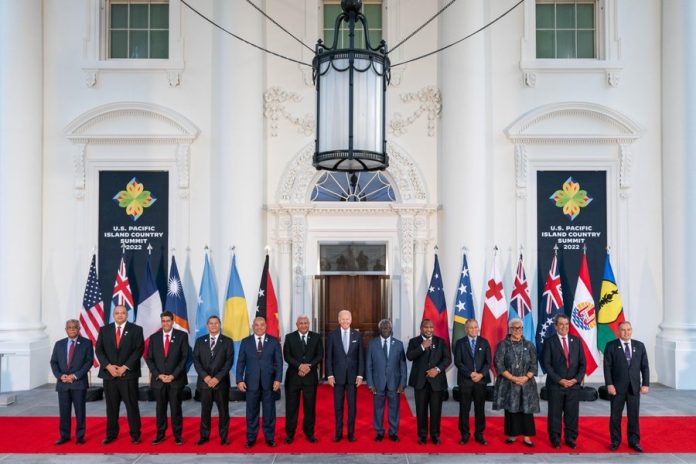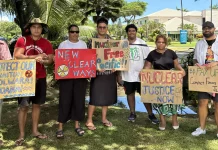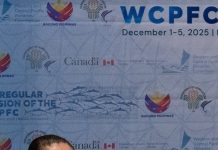We—the governments of Cook Islands, Federated States of Micronesia, Fiji, French Polynesia, Nauru, New Caledonia, Palau, Papua New Guinea, Republic of the Marshall Islands, Samoa, Solomon Islands, Tonga, Tuvalu, Vanuatu, and the United States of America—meet on the occasion of the first-ever U.S.- Pacific Islands Summit, held at the White House in Washington, D.C. from 28-29 September 2022. Forged by shared history, sacrifice, and values, our partnership has contributed to prosperity, peace, and security in the Pacific Islands, the United States, and the world for generations. Today, in the face of a worsening climate crisis and an increasingly complex geopolitical environment, we recommit ourselves to working together in genuine partnership to address the mounting challenges of our time.
First, we resolve to strengthening our partnership.
We share a vision for a resilient Pacific region of peace, harmony, security, social inclusion, and prosperity, where individuals can reach their potential, the environment can thrive, and democracy will be able to flourish. The Pacific Islands vision is reflected in its guiding documents which include the 2050 Strategy for the Blue Pacific Continent, a vision that the United States strongly supports. Achieving our shared vision requires a sustained partnership that is rooted in mutual respect, transparency, and accountability. This long-term partnership will require greater capacity; Pacific leaders welcome the United States’ commitment to enhance its engagement, including by expanding its diplomatic presence, the ties between our peoples, and U.S. development cooperation across the region.
We place the highest priority on the resolution of unresolved issues and the timely and successful completion of negotiations relating to the Compacts of Free Association between the United States and the Federated States of Micronesia, the Republic of the Marshall Islands, and the Republic of Palau—one of the cornerstones of U.S.-Pacific cooperation for nearly four decades. The United States recognizes that new resources must be part of any successful negotiation. The United States will amplify its efforts as a Dialogue Partner in the Pacific Islands Forum and will work with partners in consultation with the Pacific to deliver results for the region efficiently, effectively, and transparently.
Second, we commit to bolstering Pacific regionalism.
The Pacific Islands region is stronger united. We acknowledge the important role played by the Pacific Islands Forum in this regard.
Together we commit to bolstering Pacific regionalism, elevating and strengthening Pacific voices in international fora, and enhancing U.S. engagement with relevant Pacific regional organizations, including the Pacific Islands Forum and the Council of Regional Organizations of the Pacific agencies. We will seek greater connectivity between these organizations and other partners who share Pacific objectives and values.
We recognize the central role of the international system, particularly the United Nations, in addressing transnational challenges. Crises will continue to affect our global community in the future. We therefore recognize the urgency of strengthening the global governance architecture to make it fit for purpose and to ensure effective and timely responses to such crises, taking into account the special circumstances of small island developing states (SIDS).
Third, we are committed to tackling the climate crisis together as a priority.
We take the climate crisis as the highest priority of our partnership, for it remains the single greatest existential threat to the livelihoods, security, traditional and customary practices, and wellbeing of people in the Pacific region, including as reflected in the Boe Declaration on Regional Security.
We are united in our commitment to implement the Paris Agreement and we are committed to work together to advance progress at COP27 and beyond. We urge all countries – especially major emitters – whose 2030 nationally determined contributions targets are not yet aligned with the Paris temperature goal to increase their ambition and align such targets with a 1.5 °C pathway before COP27. We urge all developed countries to deliver on their commitment to the goal of mobilizing $100 billion annually through 2025 to support developing countries, in the context of meaningful mitigation actions and transparency on implementation. We urge all countries to reduce collective anthropogenic methane emissions at least 30 percent by 2030 from 2020 levels.
We recognize the importance of international collaboration and accelerated action especially within this decade on aviation and shipping emissions, to help put both sectors on a pathway aligned with keeping a 1.5 °C limit to temperature rise within reach.
As we combat the climate crisis, we will also work together to enhance the Pacific Islands’ climate resilience; increase their access to climate finance; cooperate to support the Pacific Islands to adapt to the impacts of climate change, from rising sea levels to more frequent flooding, cyclones and typhoons, drought and extreme weather events that contribute to the heightened risk of water, energy; and food and health insecurity. We are further committed to working together and with other countries and stakeholders to scale up finance and support related to averting, minimizing and addressing loss and damage, in particular for vulnerable developing countries.
Fourth, we are committed to enhancing our cooperation to advance economic growth and sustainable development in the Pacific.
We commit to linking our economies more closely for the benefit of all our peoples.
We also seek to forge links within the region, supporting infrastructure, transportation connectivity, cybersecurity capacities, and digital infrastructure in the Pacific.
We will be expanding our cooperation to enhance the development of the sustainable blue economy, including small- and medium-sized enterprises, labor, forestry, fisheries, agriculture, trade, tourism, and addressing supply chains issues and food security.
We recognize that the COVID-19 pandemic has wreaked havoc on Pacific economies. Economic recovery will be a top priority requiring finance not only for rebuilding purposes but to meet the commitments we made in the 2030 Agenda for Sustainable Development and the Sustainable Development Goals. To this end, we support the work of the UN Panel on Multidimensional Vulnerability Index (MVI) for Small Island Developing States and look forward to their recommendations. We encourage relevant international institutions to consider incorporating the MVI into their assessment processes where appropriate.
We further acknowledge the urgent and immediate need for assistance with vulnerability to debt, post-COVID-19.
Fifth, we are committed to supporting each other to better prepare and respond to natural disasters.
The Pacific region continues to bear the brunt of extreme natural disasters from dangerous high tides, tsunamis, ashfalls and volcanic eruptions, earthquakes, and increasing frequency of severe cyclones, hurricanes, and droughts. The increasing occurrence of these natural disasters poses existential threats to Pacific SIDS and require protracted periods of recovery, putting further pressure on limited fiscal spending space. To this end, urgent actions and long-term planning are required to increase the capacity of Pacific SIDS to predict and cope with these disasters and to implement adaptation, disaster risk reduction, and resilience strategies. The recent events in Tonga, Solomon Islands, Vanuatu, and Kiribati in recent years clearly demonstrate the devastation of natural disasters in the region.
Sixth, we resolve to protect the Blue Pacific and enhance the laws that govern it.
Together we will strengthen our cooperation on maritime security, maritime conservation, and the sustainable use of the Pacific Ocean based on the rule of law.
We acknowledge the threats posed by climate change-related sea-level rise to regional security, peace, prosperity, and development. It is essential that maritime zones and the rights and entitlements that flow from them must be maintained without reduction, notwithstanding any physical changes connected to climate change-related sea-level rise, recognizing that SIDS and other coastal States have planned their development in reliance on their rights to such maritime zones. We will continue to cooperate on fisheries-related economic development and oceans resilience through the Multilateral Treaty on Fisheries between the Pacific Islands States and the Government of the United States of America and its related Economic Assistance Agreement, while also forging new ties to improve maritime domain awareness, search and rescue, and maritime security; to curb the scourge of marine debris and plastic pollution; and to combat illegal, unreported, and unregulated fishing—a threat to the Pacific environment and livelihoods.
We will build partner capacity and capability to ensure rapid response to contingencies and emerging threats, including maritime security and safety.
Together we will find solutions to the major challenges facing the Ocean including through our commitment to conserve and protect 30% of the Ocean by 2030. We further commit to concluding very soon negotiations on the Post-2020 Global Biodiversity Framework under the Convention on Biological Diversity and a robust international legally binding instrument under the United Nations Convention on the Law of the Sea on the conservation and sustainable use of marine biological diversity of areas beyond national jurisdiction. We renew our commitment to implementing Sustainable Development Goal 14 of the 2030 Agenda for Sustainable Development including its targets through genuine and durable partnerships, in a manner that fully addresses the special circumstances of SIDS.
We reaffirm the legal rights and obligations that apply with respect to all states under international law as reflected in UNCLOS.
Seventh, we resolve to maintain peace and security across the Blue Pacific Continent.
The Blue Pacific Continent has been a place of peace for nearly eight decades. We seek to ensure it remains so. In promoting peace and security, we recognize the importance of international law as reflected in UNCLOS, including on freedom of navigation and overflight. We will oppose all efforts to undermine the territorial integrity and sovereignty of any country, large or small. We condemn all wars of aggression, including Russia’s brutal war against Ukraine.
We reaffirm our respect for the ability of nations to make sovereign decisions in the best interests of their people. The Pacific Islands note the United States’ commitment to enhance and deepen its security cooperation in the region. All of us in the Pacific region and the global economy benefit from peace and stability.
Eighth, we commit to continuing our cooperation in addressing COVID-19 concerns and other health-related issues.
We will continue to respond to the COVID-19 pandemic and other infectious-disease threats while strengthening regional and national health systems and capabilities, and strengthening the capability to prevent, detect, and respond to infectious disease threats, including through relevant regional organizations; and increase our collective commitments towards adequate, stronger, and sustainable global financing for future pandemic prevention, preparedness, and response.
Non-communicable disease is a top health priority for the Pacific Islands. We recognize the importance of addressing this issue given its impact on the health of our populations and the economic prosperity of our nations.
Ninth, we commit to expanding opportunities for all our peoples.
Our deepest ties are between our peoples. We will strengthen connections between the United States and Pacific Islands through support for education, training, youth development, and exchange opportunities. We will identify priority areas for strengthening people-to-people ties and ways to address them.
We will redouble our commitment to gender equity and equality, including the elimination of gender-based violence, both online and offline, taking full account of the 2012 Pacific Leaders Gender Equality Declaration. Together we will continue to strengthen democratic institutions across the Pacific, including through support for accountability, transparency, anti-corruption, civil society, human rights, and an independent and free media environment.
We acknowledge the critical role of the diaspora in the sustainable development of Pacific Islands and commit to strengthen links between the diaspora and local communities. We encourage expanding opportunities for diaspora investments.
We recognize the power of sports in bringing people together and commit to support the development of sports in the Pacific region. Expanding sports ties between our countries and peoples will lead to greater understanding of one another’s societies and build support for areas like health and youth development. We also recognize the positive influence of coaching and the structures which support sport.
Tenth, we reaffirm our commitment to comprehensively address the legacies of conflict and the promotion of nuclear nonproliferation.
World War II ended nearly 80 years ago, but its scars remain in the Pacific. We, too, acknowledge the nuclear legacy of the Cold War. The United States remains committed to addressing the Republic of the Marshall Islands’ ongoing environmental, public health concerns, and other welfare concerns.
The United States is committed to the safe removal and disposal of unexploded ordnance, and hereby acknowledges the concerns of Pacific Island States regarding other remnants of World War II. We are united in our support for the nuclear nonproliferation regime, including the South Pacific Nuclear Free Zone Treaty and the Nuclear Non-Proliferation Treaty; as well as the important role of the International Atomic Energy Agency.
Eleventh, way forward and future implementation of the Partnership.
This joint vision will guide us as we enter the most consequential period in the history of our partnership. Its implementation will proceed in accordance with, and be guided by, the principles it sets out: mutual respect, transparency, and accountability. To that end, our political leaders, as appropriate, and our officials will meet regularly, bilaterally and collectively, to ensure our partnership continues to deliver practical results for our people and the world. We welcome cooperation with all partners, in the region and beyond, who share in the objectives and values stated hereto. This statement is made in the respect of the competences of the signatories and of the respective governments.
Prime Minister Mark Brown of Cook Islands
Prime Minister Josaia Voreqe Bainimarama of the Republic of Fiji
President David W. Panuelo of the Federated States of Micronesia
President Edouard Fritch of the Government of French Polynesia
Charge d’Affaires Josie-Ann Dongobir of the Republic of Nauru
President Louis Mapou of the Government of New Caledonia
President Surangel S. Whipps, Jr. of the Republic of Palau
Prime Minister James Marape of the Independent State of Papua New Guinea
President David Kabua of the Republic of the Marshall Islands
Prime Minister Fiamē Naomi Mata’afa of the Independent State of Samoa
Prime Minister Manasseh Sogavare of Solomon Islands
Prime Minister Siaosi ‘Ofakivahafolau Sovaleni of the Kingdom of Tonga
Prime Minister Kausea Natano of Tuvalu
President Joseph R. Biden, Jr. of the United States of America
Ambassador Odo Tevi of the Republic of Vanuatu.
SOURCE: PIFS/PACNEWS


















